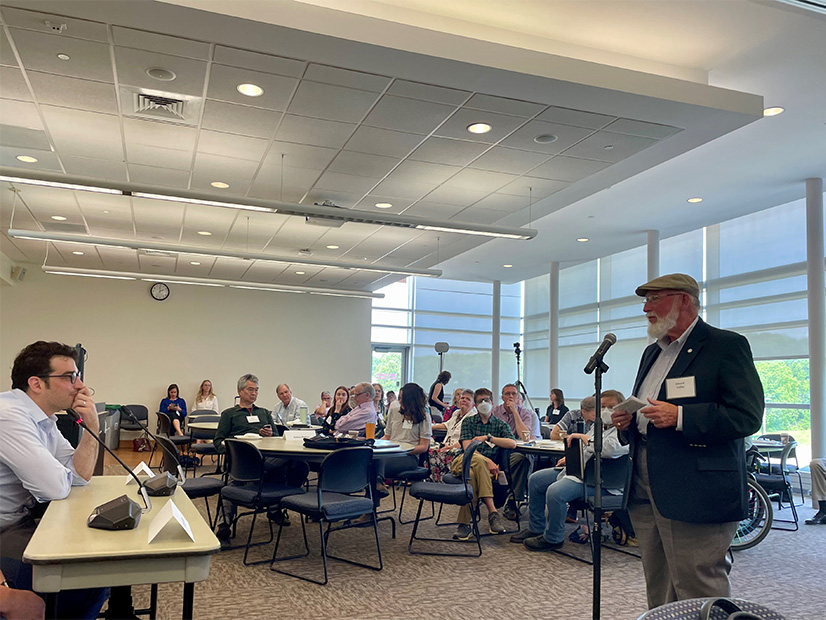HOLYOKE, Mass. — Governance structures and market rules at ISO-NE that favor incumbent interests have contributed to pushing the region into costly and carbon-intensive reliability solutions, University of Chicago Law School professor Joshua Macey told the RTO’s Consumer Liaison Group (CLG) on June 4.
Speaking to NEPOOL members, ISO-NE officials and members of the public at Holyoke Community College, Macey said the voting power of incumbents within NEPOOL has led to a bias toward capital-intensive solutions to reliability concerns.
“Reliability regulations are increasingly coming into tensions with clean energy policies,” Macey said, pointing to the reliability-must-run agreement for the Mystic Generating station and ISO-NE’s inventoried energy program, which compensates resources for keeping stored fuel on hand in the winter. The program is set to expire at the end of February.
“This is the type of intervention that essentially renders any type of clean energy policy irrelevant,” he said, arguing that out-of-market fuel security interventions constitute an admission that the capacity market is not adequately serving its reliability function.
He argued that ISO-NE’s capacity market has had small penalties for generators that can’t run when called upon. In 2014, “a resource could have met none of its obligations and still made a profit in the capacity market,” he said.
Although penalties have increased in recent years, that must be coupled with “some way to guarantee that the generator can pay,” Macey said.
ISO-NE is in the middle of a multiyear process of revising its capacity market rules to better align procurements with tangible reliability benefits. The RTO also has an ongoing project “to reduce collateral shortfalls for Pay-for-Performance penalties that generators are assessed if they fail to operate or underperform during long-duration capacity-scarcity conditions.”
Regarding transmission, Macey argued that a lack of oversight over line upgrades has led to high-cost projects that do not address the looming needs associated with the clean energy transition.
Asset-condition project costs have increased dramatically over the past 10 years, prompting states to push for changes. In response, transmission owners have rolled out some changes to the asset-condition review process, including a new database, process guide and opportunities for stakeholders to provide comment on projects in the planning stages. (See “Asset Condition Project Updates,” ISO-NE PAC Briefs: Dec. 20, 2023.)
However, asset-condition costs have continued to accumulate. In mid-May, National Grid proposed an approximately $500 million project to replace degrading wooden structures with steel poles on a line that was previously refurbished in 2008. (See ISO-NE Planning Advisory Committee Briefs: May 15, 2024.)
Since the financial risk of these transmission investments falls on ratepayers, TOs face minimal consequences for ineffective or poorly planned upgrades, Macey said.
One NEPOOL officer took exception to Macey’s characterizations of market and governance bias.
“When you look at NEPOOL, all the voting is transparent,” said Dave Cavanaugh, vice chair of the organization’s Participants Committee, whose meetings are closed to the press and public. NEPOOL’s primary role as a purely advisory body limits the power of individual companies or sectors, he argued.
Regarding Macey’s criticism of the capacity market, Cavanaugh said ISO-NE is working to address some of the issues the professor talked about, including increasing penalties. “There’s a message in the marketplace that you need to perform.”
Demand Response
Henry Yoshimura, director of demand resource strategy at ISO-NE, outlined the role of demand response in the clean energy transition.
As intermittent renewable resources increase, the grid will face “big periods of under-generation and big periods of over-generation,” Yoshimura said. These swings will lead to energy prices that increasingly “bounce around.”
This variability of supply, combined with rapidly increasing peak loads, will make DR a key resource in the coming years, Yoshimura said.
“I do think that retail rate reform is needed in order to encourage demand flexibility,” Yoshimura said, adding that time-of-use rates could incentivize end users to better align their consumption with wholesale prices.
Yoshimura noted that the proposed shift to a prompt and seasonal capacity auction could boost DR resources, which can be relatively quick to develop and could be used to fill capacity deficiencies on a shorter notice than many traditional transmission or generation solutions.




